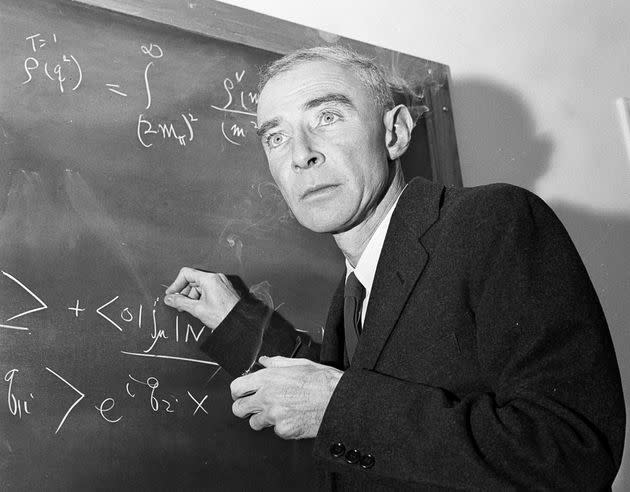Oppenheimer Grandson Slams 1 Film Scene, Denies Physicist Was 'Trying To Kill Somebody'
- Oops!Something went wrong.Please try again later.
- Oops!Something went wrong.Please try again later.
J. Robert Oppenheimer’s grandson is angry that Christopher Nolan’s film about the making and deployment of atomic bombs over Hiroshima and Nagasaki contained a scene suggesting he was “trying to kill somebody” — despite the mass deaths resulting from his creation.
“The part I like the least is this poison apple reference, which was a problem in ‘American Prometheus,’” Charles Oppenheimer told Time in a recent interview. “If you read ‘American Prometheus’ carefully enough, the authors say, ‘We don’t really know if it happened.’”
Kai Bird and Martin J. Sherwin’s 2005 book, which won the Pulitzer Prize for biography, essentially served as the blueprint for “Oppenheimer.” Both contained a scene from the physicist’s time at the University of Cambridge.
The moment occurs early in the film and shows J. Robert Oppenheimer (Cillian Murphy) seemingly trying to poison his tutor with a potassium-cyanide-laced apple. He then scrambles to throw it away before physicist Niels Bohr (Kenneth Branagh) unknowingly reaches for it.
“There’s no record of him trying to kill somebody,” Charles Oppenheimer told Time about the scene. “That’s a really serious accusation and it’s historical revision. There’s not a single enemy or friend of Robert Oppenheimer who heard that during his life and considered it to be true.”
Charles Oppenheimer added he was bothered the moment was included in “American Prometheus” without a disclaimer noting it was “an unsubstantiated rumor.”
He added that Nolan’s film “told a compelling story,” however, which he accepted as “art that was really engaging.”

Charles said his grandfather, J. Robert Oppenheimer (pictured), never tried to kill his tutor.
As for the hundreds of thousands killed as a result of his grandfather’s work, Charles Oppenheimer said that the U.S. government wrestled control of J. Robert Oppenheimer’s creation away from him and refused to heed his proposals on how to manage the new weapon.
“I think his advice is really relevant today, because he was right about how to manage atomic energy,” he told Time. “If we had followed his actual hard policy proposals, we could have avoided an arms race right after World War II … [He] saw where we should go.”
The U.S. detonated two atomic bombs over Hiroshima and Nagasaki in August 1945, killing an estimated 210,000 people. As shown in the film, former President Harry Truman refused to heed J. Robert Oppenheimer’s advice to co-manage America’s new power with its allies.
Charles Oppenheimer argued that sharing access to these weapons with the U.K. and Russia, which changed global power dynamics forever, would have avoided the endless arms race still continuing today.
While he had gripes with the apple scene, Charles Oppenheimer is admittedly biased.
“I find that being related to him and having insight into who he was doesn’t always seem that interesting to other people,” he told Time. “They’re happy to ask a historian or a writer, and it’s not necessarily true that my impression of his values is taken as the answer.”
“So I kind of struggle with saying that I have a view of who he is and what he cared about.”
